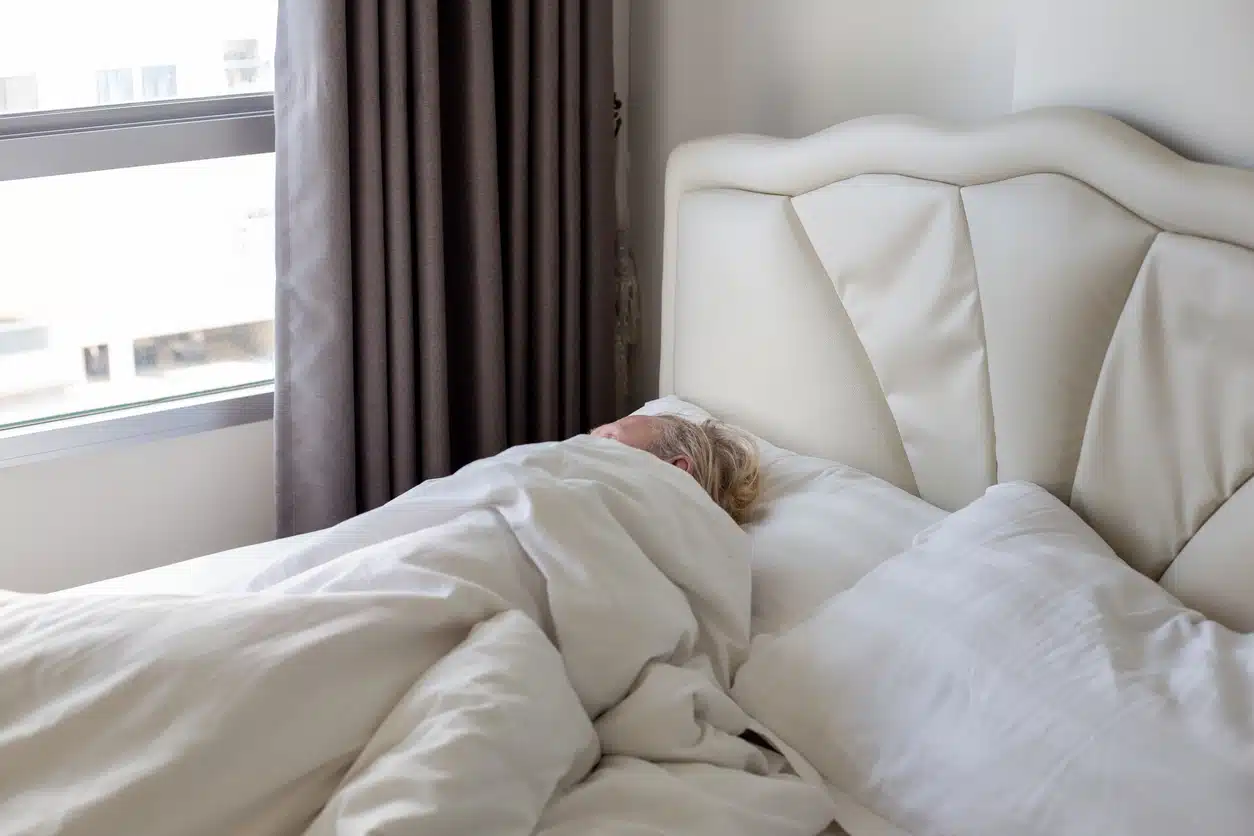Which Types of Foods Can Cause Nightmares?
Social Links
We all know the pleasant feeling of waking up from a lovely dream, perhaps one in which we’ve won the lottery, been relaxing on a golden beach or encountered a loved one that we miss. Similarly, we all know what it’s like to wake up scared, sad or surprised after a nightmare – falling, losing teeth or finding ourselves in a state of undress in public are common ones. We may not always remember the details, but we always remember that feeling.
Many studies have been done on dreams and dreaming, and while most of them seem to agree that dreaming is important to our cognitive and emotional processes, none of them really know why. Similarly, they can’t figure out why some dreams are bad, some are good and others just downright bizarre. Are dreams influenced by external stimuli? Is it just all in our minds? Or could it, perhaps, be down to what we eat?
Can certain foods cause dreams?
We know that certain foods influence the quality of our sleep. Caffeine, for example, is a known stimulant that can prevent us from nodding off. Eating heavy, carb-filled food before bed may also reduce the quality of sleep, as the digestive processes use a lot of energy which is diverted from our usual sleep functions.
But when it comes to dreams, surprisingly little research seems to exist on their correlation to food and none of it is conclusive. However, we all have our own story or a tale we’ve heard about how a certain food before bed produces vivid or recurring dreams. Could it be true? Or could it just be an urban myth that we choose to believe because it’s so interesting?
Perhaps it’s up to the individual to decide… so to help you, here is our list of foods most commonly said to influence dreams, as well as some surprising ones:
1. Cheese
Whenever anyone talks about which food gives you nightmares, cheese is, perhaps, the food that stands most accused of producing bad dreams. However, this allegation was refuted in a study by the British Cheese board in 2005, in which none of their participants reported nightmares after eating cheese before bed. However, some did report having strange or unusual dreams after eating Stilton or other blue cheeses, which could be explained by the bacterial and fungal content present in those products. On the other hand, cheese may only be guilty of simply being in the wrong place at the wrong time, since it’s such a popular pre-bedtime snack.
2. Milk
A surprising accusation, as warm milk is well-known for its sleep-inducing qualities and we’ve been using it to help us nod off since time immemorial. It could be that milk is believed to influence dreams because of the presence of tryptophan in milk, an amino acid which helps in the production of the mood stabiliser serotonin. However, it’s been found that some antidepressants, which regulate the uptake of neurotransmitters including serotonin, can cause the individual to have much more intense and real-feeling dreams, so perhaps there is a case for milk influencing our dreams, if only slightly.
3. Ice cream
As it contains very similar ingredients and compounds to milk, it makes sense that if one can influence our dreams, then so can the other, so it’s a reasonable argument that dairy can produce nightmares. On the other hand, it’s likely that the presence of so many dairy foods on the list is indicative of increased instances of lactose intolerance, which can often manifest as indigestion during the night.
4. Cherries
Cherries – particularly tart ones – are high in melatonin, the hormone that helps regulate sleep. Melatonin reacts to increasing or decreasing daylight by helping us wake up or become tired, and regulates our sleep patterns during the night. Higher levels of melatonin increases REM sleep, which is when we do most of our dreaming. Therefore, people who produce or ingest enough melatonin spend more time in this deep sleep, and so are more likely to have vivid dreams, either good or bad.
5. Nuts
Nuts are also high in melatonin, and therefore help us get more REM sleep. All nuts have some level of melatonin, but pistachios have the highest, followed by almonds, walnuts and cashews. Many nuts also have high levels of magnesium, which helps relax muscles and can alleviate symptoms such as restlessness and muscle cramp, helping us to stay asleep for longer.
6. Alcohol
Although it can make you drowsy and help you fall asleep, alcohol disrupts the sleep cycle so we spend less time in REM sleep, making us much less likely to dream at all. On the other hand, many of us have had our own experiences of strange dreams after a glass of wine or two, so perhaps the jury is still out on this one.
7. Sugar
Sadly, a sweet tooth may be more likely to produce sugar nightmares than sweet dreams. This is because sugary foods such as cake, sweets and soft drinks have an energising effect, kickstarting your metabolism and making it much more difficult to fall asleep. Despite this, a study by Frontiers in Psychology found that their participants were more likely to report strange or bizarre dreams after eating sugary snacks, rather than nightmares, so perhaps that energising effect can in fact influence our dreams once we actually get to sleep.
8. Pasta and bread
These food staples have a high carbohydrate content, which gets converted into sugar by the body, so their effect on dreams, if any, is likely to be the same as for cakes and sweets. So, if you want to avoid surreal, bolognaise-induced dreams, be sure to enjoy your spaghetti and garlic bread several hours before bed time.
9. Chocolate
This is another food with a high sugar content, so like sweets and carbs may cause you to wake up scratching your head at your brain’s nocturnal creativity. However, as chocolate also contains caffeine which prevents you falling asleep, it may also affect the time you spend in deep sleep and therefore decrease the likelihood of these dreams occurring.
10. Marmite
Marmite contains high levels of vitamin B6, which helps convert certain amino acids into serotonin and therefore may influence the lucidity of dreams. Other foods high in vitamin B6 include avocados, bananas, broad beans, herring, molasses and Marmite’s Australian equivalent, Vegemite.
11. Salmon
Another food that’s high in vitamin B6, and along with other fatty fish including herring and tuna – including from a tin – is also high in melatonin, making it a potential all-round dream influencer.
12. Spicy foods
Although not conclusive, one study found that spicy foods such as chilli and tabasco cause an increase in body temperature, which could influence brain activity and potentially disturb sleep. This sleep disruption, combined with an increased likelihood of discomfort from heartburn and acid reflux, may also make you more likely to wake up in the middle of a dream, which means you’re more likely to remember it. This may make you feel as though you’ve had more dreams than usual, and therefore more likely to attribute it to the food.
13. Mustard
Like spicy food, mustard can also be attributed to an increase in body temperature which may disturb dreams. It may also be a case of accepted folklore owing to a mention in Charles Dickens’s A Christmas Carol, when Ebenezer Scrooge accuses his ghostly visitor of being simply the result of “an undigested bit of beef, a blot of mustard, a crumb of cheese, a fragment of an underdone potato”.
14. Welsh rarebit
This may be another result of popular culture, emerging from the comic strip Dream of the Rarebit Fiend which was popular in the early 1900s. Or it could just be the combination of cheese, carbohydrates and mustard playing havoc with our sleep hormones and digestive systems.
15. Mince pies
Mince pies also got a mention in the aforementioned comic strip, probably because at the time a ‘mincemeat pie’ was in fact a nightmarish concoction of minced offcuts of meat, suet and spices. If it’s still on the list, it may be due to the fact that mince pies are most commonly consumed in the lead up to Christmas, a time of high anxiety known to produce stressful dreams and interrupted sleep, and so they make an easy scapegoat.
16. Processed meats
Heavily processed meats such as hot dogs, sausages, hamburgers and salamis all contain high levels of tyramine, an amino acid responsible for regulating blood pressure. It also triggers the release of the neurotransmitter noradrenaline, which affects an area of the brain linked to dream sleep – therefore potentially disrupting dreams and causing nightmares.
17. Pickles
As with processed meats, pickled and fermented foods like gherkins, soy sauce, sauerkraut and even tofu also contain high levels of tyramine, making them potential dream disturbers. Similarly to spicy foods, pickles are more likely to cause discomfort due to indigestion and wake a person up mid-dream, increasing the chances of dream recall.
18. Pizza
If it’s true that all the above foods can cause bad dreams, or at least more peculiar or vivid ones, then pizza must truly be the stuff of nightmares – combining carbohydrates, cheese, spicy sauces and processed meats. However it must be tasty enough to warrant whatever affects it may have on our sleep-time sojourns, as it remains as popular a night-time snack as ever.
Can any foods cause good dreams?
Well, probably not directly. But don’t fear, because it’s possible that your diet overall can. One study, for example, found that diets low in saturated fat but rich in fibre contributed to deeper, more restorative sleep uninterrupted by nightmares. Another found that participants who enjoyed a primarily organic diet had better dream recall as well as more meaningful and recurring dreams, often involving water, flying and risk taking.
Avoiding heavy foods before bed can also help avert disturbed sleep by reducing the chances of discomfort from indigestion and allowing the body’s resources to turn their full attention towards the healing and restorative work they do when we’re asleep. Instead of carbohydrates, greasy or spicy foods, choose a midnight snack that can be digested slowly and easily, such as rye crackers, cottage cheese, yoghurt, white meat or a banana.
Can hunger affect dreams?
Curiously, just as overeating can influence our time in the twilight zone, so potentially can a lack of food, or fasting. In many cultures, fasting and starvation has been used as a technique by shamans, priestesses and wisemen to bring on lucid dreams or even hallucinations, as a way of communing with the spirit world. This could be because extreme privation in the body can trigger the production of small amounts of dimethyltryptamine (DMT), a known hallucinogenic compound which could quite conceivably cause highly lucid and unreal dreams. On the other hand, it may just be our body’s way of trying to tell us something; many of us have experienced a dream of being extremely hungry or thirsty, and waking up to discover we are just that.
The bottom line
We all have our own stories of how a certain type of food gives us strange or bad dreams. Perhaps a late-night cheese sandwich made you dream you were falling out of the sky, or a spicy curry induced a vivid impression of your boss giving you the sack. Whether or not specific foods can actually influence our dreams is yet to be conclusively proved by science. It may well be that food is just a convenient scapegoat, and that our late-night indulgences are more likely to wake us up in discomfort, meaning we’re more likely to remember any dreams and therefore imagine we’ve dreamed more than usual, and blame it on the food.
What does seem to be clear is that a good diet can affect the quality of our sleep in a positive way, helping us to sleep longer and deeper and therefore be less likely to remember or be disturbed by our dreams. Similarly, managing stress and anxiety levels can also keep us from tossing and turning at night. In the meantime, we’ll have to wait for more evidence before we know if, and what, food can induce a night-time reverie with our long-lost love or luxuriating on our private yacht. Until then, perhaps, we’ll have to keep on dreaming.
*This website contains general medical information. The medical information is not advice and should not be treated as such. Read our full Medical Disclaimer here.



